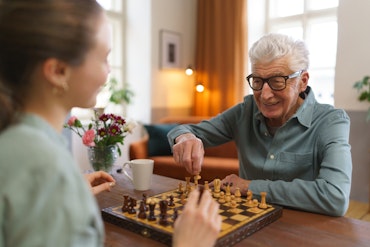What does technology have to do with Alzheimer’s disease?
How could technology reduce cognitive decline in older Australians?
![<p>Technology and activities to reduce your risk of Alzheimer’s disease might be more similar than you think. [Source: Shutterstock]</p>](https://agedcareguide-assets.imgix.net/news/articles/wp/mantablet1903.jpg?fm=pjpg&format=auto&w=550&q=65)
Technology and activities to reduce your risk of Alzheimer’s disease might be more similar than you think. [Source: Shutterstock]
Key points:
- One early sign of cognitive decline could be detected by the accuracy of walking on a curved path, according to recent study results
- Mild cognitive decline is associated with early Alzheimer’s disease
- Puzzles and brain games to improve cognitive ability can also be played on phones and computers through free programs such as BeConnected
Researchers suggest that early cognitive decline could now be detected through a person’s walking skills on curved and straight paths, according to new data.
Alzheimer’s disease is the most common form of dementia, with up to 70 percent of people with dementia diagnosed with Alzheimer’s disease. In 2022, the Australian Institute of Health and Welfare estimated that over 401,000 Australians were living with some form of dementia, which suggests there may have been over 280,000 Australians affected by Alzheimer’s disease.
In Alzheimer’s disease, initial problems are first observed through thinking, memory and other cognitive difficulties, and can eventually lead to changes such as confusion and differing behaviours.
This study found that people with mild cognitive impairment found it more difficult to walk on curved paths than people without cognitive impairment. Walking difficulties were more apparent in the curved path walking in comparison to the straight paths.
It’s for this reason that Behnaz Ghoranni, senior author and associate professor at Florida Atlantic University College of Engineering and Computer Science, sees great benefit in using curved path walking, instead of just straight path walking for early cognitive decline detection.
“[…] Curved path walking may be more sensitive to detect mild cognitive dementia, which can complement cognitive assessments and aid in early diagnosis and management,” said Ghoraani.
Stella Batalama, who is the dean at Florida Atlantic University College of Engineering and Computer Science, is optimistic about how this study could impact future research.
“[This could] also extend to clinical practice by providing improved methods for screening and monitoring that can be easily replicated with minimal costs and time in the clinic setting,” said Batalama.
While having difficulty walking on a curve could be an early sign of cognitive decline, there are ways to reduce cognitive decline, such as engaging in brain games.
The benefits of puzzles and brain games cannot be understated. However, such activities can also be completed using technology. With the connection of the internet, people from all over the world can play each other and compete to reach the leaderboards, which can add healthy competition to an otherwise isolating activity.
For older Australians who struggle with technology, the government created BeConnected, a program to help them become more confident in their abilities when using technology. In addition to countless articles to teach you about technology and cybersafety, there are also interactive courses on this website to help you learn about the features of your own devices.
If you’re using a laptop or desktop computer, these games from BeConnected are suitable to improve your cognitive skills. Other games are also available on your smartphone or tablet, including WordUp.
The premise of WordUp is relatively simple, with the user choosing letters from the selection available on the screen to create words. The navy-coloured letters achieve normal points, but including the lighter blue will get you bonus points. The goal is to get as many points as possible.
The eSafety Commissioner Julie Inman Grant wants older Australians to understand that online games aren’t just for kids and that everyone can enjoy the benefits of technology.
“Exploring online games like the one we’ve developed in WordUp can really build an extensive range of ‘real-world’ benefits such as manual dexterity and brain plasticity,” Grant said on May 13, 2021.
What online game from BeConnected will you play first?
Let the team at Talking Aged Care know on social media.
Don’t forget to subscribe to the FREE newsletter to stay up to date with relevant articles and content for the aged care sector.
Relevant content:
How to help older adults use emojis























